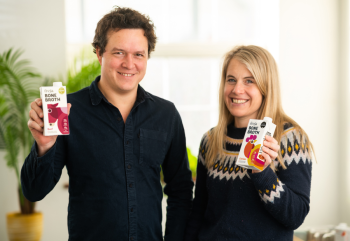
UK-based Freja is aiming to become “Europe’s number one” bone-broth brand after attracting the support of well-known food-industry executives.
Freja, founded in 2020, markets a range of broth, emphasising the products’ Norwegian provenance.

Discover B2B Marketing That Performs
Combine business intelligence and editorial excellence to reach engaged professionals across 36 leading media platforms.
It has completed a fundraising round worth £2m ($2.5m), receiving investment from former Unilever CEO Paul Polman and Giles Brook, the former chief executive for Vita Coco in EMEA who is now a regular investor in up-and-coming food businesses.
Ed Armitage, the CEO of Freja told Just Food, the company is “really going through a big period of growth”. Armitage forecasts the company’s annual turnover will be approximately £5.8m in its 2024 fiscal year, which would be more than triple the previous year’s £1.8m. Freja, which is not yet profitable, has sold 1m units of products to date, he added.
The fresh funds will be used to support Freja’s expansion into new geographic markets, launching more products and growing its workforce.
The new round of funding was Freja’s second but the company declined to disclose how much it raised since its formation in March 2020. The company is not planning to do further fundraising rounds.

US Tariffs are shifting - will you react or anticipate?
Don’t let policy changes catch you off guard. Stay proactive with real-time data and expert analysis.
By GlobalDataFreja was founded by Armitage and his wife Jess Higgins, who own a combined majority stake in the business.
Its product portfolio includes four variations of bone broth – beef, chicken, fish and a vegan option – which have a 24-month shelf-life.
In the UK, Freja’s broth is available in 500ml cartons through the business’ website, Amazon and Ocado. It sells in Selfridges, Booths and Whole Foods Market stores. The company also does business in Germany. Overall, online transactions make up 90% of the company’s sales.
“The way to build a brand quickly now is to be an omnichannel brand,” Armitage said. “Our strategy with any country is to launch quickly using marketplaces like Amazon and after that to use our own e-commerce website and build a D2C digital business, because that allows you to – via Facebook ads and so on – to really create a direct relationship with the consumer very quickly.”
After solidifying sales in e-commerce, the company’s next step is to try to secure retail listings.
“Now we’re on Ocado and we’re in conversations with larger retailers,” Armitage said. “It’s a bottom-up approach from independence to big chains.”
Freja is looking to “launch across the whole of Europe” but is first focusing on expanding in the north of the continent.
Armitage declined to comment on which country will be the next new market for Freja.
However, reflecting on the possible market, he said: “The overall bouillon category is shrinking, nearly flat in almost every country in Europe. It’s not a very fun category. There’s not a lot of excitement or innovation in this category but this sub-category of liquid products is growing really fast and that is the case everywhere in Europe.”
Freja’s team has recently grown to 12 employees after hiring five people. Armitage said the food producer is planning to hire ten more staff in the next two years.
Freja is planning to scale up production “in-line with [its] sales targets”. The company uses third-party manufacturers in Norway and Sweden.
Armitage said the company chose the countries for production because “sourcing from Scandinavia and effectively building a Scandinavian brand would overcome some of those trust barriers that exist between different countries in Europe”.
“Scandinavia has a premium aspect to it as well. […] everyone respects Scandinavia, for the animal welfare standards, environmental standards and broader societal standards,” he said.
Armitage said that “over 70% of [Freja’s] customers buy bone broth primarily because of functional reasons”.
“They’re prepared to pay a bit more”, he added, emphasising that bone broth in its liquid format is a “premium product” and conceding its price tag means it is “not for everyone”.





